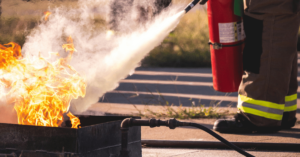Quick COSHH Summary (TL,DR)
COSHH, standing for Control of Substances Hazardous to Health, is a critical set of UK regulations designed to protect workers from the risks posed by hazardous substances.
With 13,000 deaths annually linked to workplace exposure to dangerous materials, COSHH compliance is non-negotiable for businesses.
Effective since 2002, the COSHH regulations require employers to assess risks, implement control measures, and ensure employees are safeguarded from chemicals, dust, vapours, and other hazardous agents.
Failure to adhere to COSHH can result in severe legal, financial, and health repercussions, including unlimited fines and significant operational disruptions. Both employers and employees have responsibilities under COSHH, emphasising a collective approach to maintaining a safe work environment.
For self-employed individuals, COSHH applies with specific exceptions around monitoring and health surveillance.
Ensuring your team is COSHH compliant fulfils legal obligations, protects health, improves productivity, and upholds your business’s reputation.
A key piece in the COSHH puzzle is information and training so employees understand their roles.
Introduction to COSHH
Diving into the heart of workplace safety, COSHH refers to regulations designed to shield workers from the dangers lurking in hazardous materials.
This guide embarks on a comprehensive journey through the COSHH landscape. We unveil the essential measures and insights employers and employees must embrace to foster a secure and health-conscious working environment.
Join us as we navigate the complexities of COSHH, ensuring your business is equipped and informed to tackle the risks associated with hazardous substances head-on.
What does COSHH stand for?
COSHH stands for Control of Substances Hazardous to Health.
What is COSHH?
COSHH is a fundamental pillar of workplace health and safety regulations in the United Kingdom. It was established on the 21st of November 2002, named the Control of Substances Hazardous to Health Regulations 2002.
Fundamentally, this regulatory framework is designed to protect workers from the health risks of hazardous substances.
COSHH covers an extensive array of substances and mixtures. Each can potentially harm health through ingestion, inhalation, or contact with the skin and other bodily membranes.
These hazardous materials come in various forms – solids, liquids, vapours, gases, and fumes, extending to simple asphyxiants and biological agents.
This broad scope underscores the importance of vigilance and proper safety measures in the workplace to protect against a wide spectrum of serious health hazards and risks. The COSHH regulations detail the measures that must be taken.
What are the COSHH hazardous substances?
COSHH hazardous substances are chemicals and materials that can pose risks to health when used or encountered in the workplace.
These substances can cause harm through inhalation, ingestion, skin or eye contact, and can be found in various forms. The COSHH substances include:
- Chemicals: This broad category includes industrial chemicals, cleaning products, paints, and solvents.
- Fumes: Metal fumes from welding or soldering operations are common examples.
- Dusts: Wood dust, flour dust, and other fine particles from different materials can be hazardous.
- Vapours: Evaporated substances, such as those from solvents or adhesives, that may be inhaled.
- Gases: Includes industrial gases like chlorine, ammonia, or carbon monoxide.
- Biological Agents: Bacteria, viruses, and other microorganisms that can cause health effects.
- Nanomaterials: Microscopic particles that can pose unique health risks.
- Asphyxiants: Substances in high concentrations that can deprive the body of oxygen, such as nitrogen or carbon dioxide.
It’s important to note that COSHH covers substances that are hazardous to health, regardless of their physical form.
This includes materials that may not always be considered dangerous. However, they can become hazardous under certain conditions or when used in particular ways.
Identifying these substances is the first step in the COSHH risk assessment process, leading to implementing appropriate control measures to prevent harm and protect health.
Which Hazardous Substances Does COSHH Not Cover?
As you can see, COSHH covers a broad range of hazardous substances, but it does not apply to particular specific substances and situations. That’s because other, more specific regulations take precedence. Notably, COSHH does not cover:
- Asbestos: Although asbestos is deemed a hazardous substance, its handling and control are governed by specific asbestos regulations due to its unique health risks and the need for specialised control measures.
- Radioactive substances: The management and control of radioactive substances and ionising radiations are covered under separate, dedicated regulations.
- Biological agents that are outside the employer’s control: For instance, exposure to biological agents is not directly related to the work activities being carried out.
- Lead: Exposure to lead and its compounds is controlled by specific lead regulations that outline particular requirements for monitoring and controlling lead in the workplace.
These exclusions are due to the existence of specific regulations that are tailored to manage the unique risks associated with these substances.
They often require specialised approaches to health and safety management.
What do the COSHH Hazard Symbols Mean?
There are several different signs to look out for when it comes to identifying a hazardous substance or material. Here are some signs you might come across :
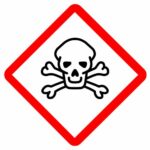
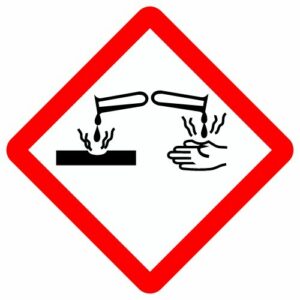
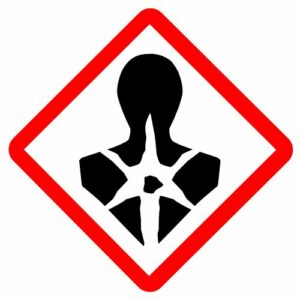
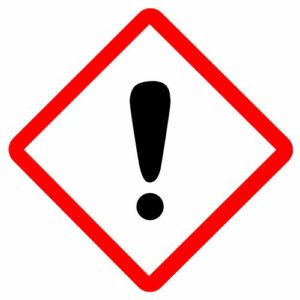
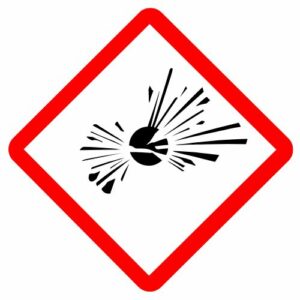
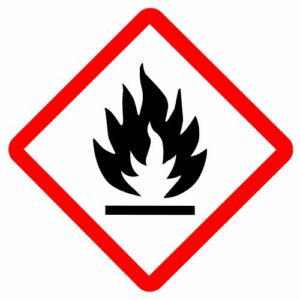
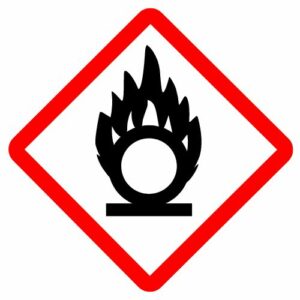
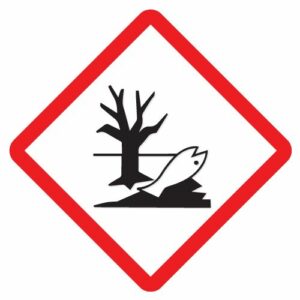
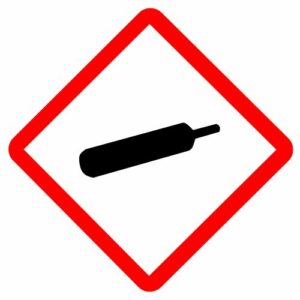
COSHH Regulations
In the realm of workplace safety, understanding and applying the COSHH Regulations is non-negotiable.
This section dives deep into the core regulations that form the backbone of COSHH, offering a roadmap for employers and employees to navigate the complexities of hazardous substances.
From the initial steps of risk assessment to the meticulous care in the use, maintenance, and monitoring of control measures, each regulation is a critical piece in the puzzle of workplace safety.
Here is a breakdown of the key areas in the regulations:
At the heart of COSHH is the requirement for employers to conduct thorough COSHH risk assessments.
A COSHH risk assessment involves identifying substances that could pose a risk, understanding how these substances can harm health, and evaluating the severity and likelihood of that harm occurring.
It’s a proactive approach to identifying potential dangers before they cause harm.
Following the risk assessment, employers must implement appropriate controls.
These vary from substituting hazardous substances with less dangerous ones, to using closed systems for handling chemicals, improving ventilation, or providing personal protective equipment (PPE).
The goal is to minimise exposure and mitigate risks.
It’s one thing implementing controls, but employers must ensure their proper use.
The regulation involves a dual focus: first, on the technical side, ensuring all control equipment (like ventilation systems and personal protective equipment) is in optimal working condition and used as intended.
Second, it emphasises the human element, requiring that employees are not only trained on how to use these controls effectively but are also committed to using them consistently in their daily tasks.
This regulation is about turning safety plans into action. That means ensuring that the measures devised for protection are alive in the daily operations of the workplace, thereby actively safeguarding health and safety.
It’s not enough to set controls in place; they must be regularly inspected, maintained, and tested to ensure they remain effective over time.
This could involve checking ventilation systems, examining protective equipment, and ensuring that all safety measures meet high standards.
If a substance is classified as a carcinogen, mutagen or asthmagen, employers must control exposure and attain levels as low as is reasonably practicable (ALARP).
For this reason. regulation 10 mandates continuously monitoring employees’ exposure to hazardous substances to ensure they remain within safe workplace exposure limits (WELs).
Employers must monitor WELs (themselves or using a consultant) by making precise measurements of substances found in the air while they are working.
Monitoring is an essential process for verifying that the measures used to control exposure are effective. This is generally indicated when exposures are below the workplace exposure limit for the given substance.
Workplace exposure limits (WELS)
Workplace exposure limits (WELs) are occupational exposure limits that HSE has approved. These can be found in HSE’s EH40 publication.
WELs refer to concentrations of hazardous substances in the air. They provide employers with safe limits on which to base their measurements.
Where there’s a significant risk to health, employers are required to put in place health surveillance measures.
This could mean regular health checks to catch early signs of illness from exposure to hazardous substances, ensuring that any health impact is recognised and managed promptly.
Knowledge is power. COSHH mandates that workers receive comprehensive information and training on the hazards associated with substances they work with, safe handling practices, and what to do in an emergency.
This empowers employees to be active participants in their safety and health at work.
COSHH requires planning for emergencies involving hazardous substances, such as spills, leaks, or accidental exposures.
This includes having procedures in place to deal with such incidents swiftly and effectively, minimising harm to health and the environment.
What are the Three Main Regulations of COSHH?
You will already see that COSHH is a comprehensive framework with multiple regulations. However, three pivotal aspects stand out for effectively managing COSHH in the workplace:
- COSHH Risk Assessment (Regulation 6): Employers must conduct detailed COSHH risk assessments to identify hazards, evaluate the risk of exposure, and determine appropriate measures to mitigate these risks. This foundational step is crucial for understanding and managing workplace health risks.
- Implementation of Controls (Regulation 7): Employers must implement suitable controls to prevent or limit exposure following the risk assessment. This regulation emphasises the hierarchy of controls, from eliminating the hazard entirely to using personal protective equipment (PPE) as a last resort.
- Health Surveillance (Regulation 11): Where there is a risk to health, employers must arrange appropriate health surveillance for employees potentially exposed to hazardous substances. This involves monitoring workers’ health to identify early signs of work-related ill health and to ensure the continued effectiveness of implemented controls.
Who Enforces the COSHH Regulations?
The enforcement of COSHH (Control of Substances Hazardous to Health) Regulations in the United Kingdom is primarily the responsibility of two main bodies: the Health and Safety Executive (HSE) and local authorities.
The HSE is the national regulator for workplace health and safety. It oversees various industries, including manufacturing, construction, and agriculture, ensuring compliance with health and safety laws, including COSHH regulations.
Their role is to conduct inspections, investigate incidents, and take enforcement action against non-compliance.
Local authority environmental health departments are responsible for enforcing COSHH regulations for certain sectors, particularly those involving direct interactions with the public like retail, leisure, and office environments.
They ensure businesses within their jurisdiction comply with health and safety standards, conducting inspections and investigations similar to the HSE.
Both bodies work to protect workers’ health by ensuring that employers comply with COSHH regulations.
Why is the Control of Substances Hazardous to Health (COSHH) Important?
The Control of Substances Hazardous to Health (COSHH) is crucial for companies for several compelling reasons, underscoring the importance of managing hazardous substances effectively:
Health and Safety:
COSHH is fundamental in protecting workers from health risks associated with hazardous substances.
By assessing risks and implementing controls, companies can prevent a range of health issues, from minor irritations to serious conditions like asthma, cancer, or skin diseases.
Legal Compliance:
Adhering to COSHH regulations is a legal requirement for businesses in the UK. Failure to comply can result in fines, legal action, and reputational damage.
Thus, COSHH compliance is not just about safety; it’s also about fulfilling legal obligations.
Productivity and Morale:
A safe workplace is a productive workplace.
Implementing COSHH measures helps create a healthier work environment, reducing absenteeism due to illness and increasing employee morale.
Workers will be more likely to be engaged and productive if they feel their health and safety are a priority.
Cost Savings:
Addressing health risks proactively can lead to significant cost savings.
By preventing workplace illnesses and accidents, companies can avoid the costs associated with lost workdays, healthcare, compensation, and potential legal fees.
Reputation:
Demonstrating a commitment to health and safety through COSHH compliance can enhance a company’s reputation with clients, investors, and within its industry.
It shows a responsible and ethical approach to business operations.
Continual Improvement:
The COSHH framework encourages companies to review and improve their control measures regularly.
This ensures ongoing compliance and fosters a culture of continuous improvement in health and safety practices.
What Will Happen if Companies Don’t Comply with COSHH 2002?
Failing to comply with the regulations carries severe implications across several dimensions for both employers and employees.
Legal Ramifications
Legally, it can lead to enforcement actions by health and safety authorities, including improvement or prohibition notices, and in serious cases, prosecution with the possibility of fines or imprisonment for those responsible.
Financial Repercussions
The financial repercussions extend beyond legal penalties, encompassing costs from legal proceedings, increased insurance premiums, compensation claims, and indirect costs such as downtime and lost productivity.
A business found to be breaking COSHH protocol can face an unlimited fine. As evidence of this fact, in 2021, a Health and Safety Executive report shows that companies received a collective £26.9 million in fines for their failure to enforce health and safety regulations.
Social
The primary concern, however, is the health and safety risk that such substances pose to employees.
Without implementing proper control measures to reduce harm, exposure to hazardous substances is likely to cause a range of occupational illnesses.
These can include acute conditions and chronic health issues, which can affect employee well-being and leade to absenteeism and reduced morale.
Government statistics exemplify this, with an estimated 38.8 million working days missed in the UK due to work-related ill-health and non-fatal workplace injuries. If an employee cannot work, the business will inevitably lose out.
Business Reputation
Beyond the tangible legal and financial consequences, non-compliance can also tarnish an organisation’s reputation. Negative publicity surrounding safety failures can lead to lost business, challenges in recruiting talent, and strained relationships with clients and the community.
Performance Impact
Operational disruptions are another consequence, as enforcement actions may necessitate changes or halts in business activities, affecting productivity and overall performance.
Thus, adherence to the regulations is not just a legal obligation but a critical component of maintaining a healthy, safe, and productive working environment, safeguarding the organisation’s reputation and operational viability.
COSHH Responsibilities
What are an employee’s responsibilities?
It would be easy to think that all the responsibility lies with the employer, but it doesn’t.
COSHH regulations apply to employees too. They have critical responsibilities to ensure their safety and the safety of others when working with hazardous substances.
Of course, the primary duty to comply with COSHH rests with employers, but employees must actively participate in safety practices.
An employee’s responsibilities include:
- Following Processes and Procedures: Adhering to the safe work practices, control measures, and procedures that their employer has put in place to manage the risks associated with hazardous substances.
- Using Personal Protective Equipment: Correctly using personal protective equipment (PPE) and other safety equipment provided for their protection, as required.
- Attending Training: Participating in COSHH training and health surveillance programs provided by the employer to understand the risks and the necessary precautions when handling hazardous substances.
- Reporting Issues: Employees should promptly report to their employer any safety concerns, malfunctions in control equipment, or incidents of exposure to hazardous substances, to ensure the employer can take immediate action.
- Cooperation: Cooperating with employers in their efforts to comply with legislation, including providing feedback on control measures and suggesting improvements.
What are an employer’s responsibilities?
As per the regulations outlined previously, the employer’s responsibilities are extensive. Key responsibilities require that employers do the following as a minimum:
- Conduct detailed risk assessments and identify control measures to mitigate risks
- Implementing suitable control measures to prevent or significantly reduce exposure to hazardous substances. This includes adopting the hierarchy of controls.
- Provide employees with clear information, instruction, and training on the risks associated with hazardous substances, safe handling practices, and the use of control measures and PPE.
- Arrange appropriate health surveillance for employees exposed to hazardous substances, where necessary, to monitor their health for any adverse effects and take preventive actions.
- Prepare for and respond to emergencies involving hazardous substances, including spills, exposures, or accidents, with effective procedures and measures to mitigate risks.
- Ensure they properly maintain, test and ensure control measure effectiveness to prevent or reduce exposure to hazardous substances.
Does COSHH apply to self-employed people?
Yes, COSHH does apply to self-employed individuals.
If their work involves hazardous substances, they must comply with COSHH regulations. This includes assessing risks, implementing control measures, and ensuring their own health and safety.
Self-employed people have the same responsibility for managing hazards as employers do for their employees.
Self-Employed with no employees? If so, Regulation 10, Monitoring Workplace Exposure, does not apply
The only element of COSHH that does
If you have no employees (but you take hazardous substances to other peoples premises), all parts of COSHH 2002 apply except those about monitoring and health surveillance.
Develop your team’s skills with COSHH training
Making sure you equip your team to deal with hazardous substances is crucial.
Our COSHH training course will give them everything they need to work safely. It covers topics like:
- Understanding the regulations
- Conducting a COSHH Risk assessment
- Safety data sheets
- Health surveillance
…and more to keep your team protected while they’re working with hazardous materials.
Speak to our friendly team about what we can offer your team, and how we can tailor it to your needs.




